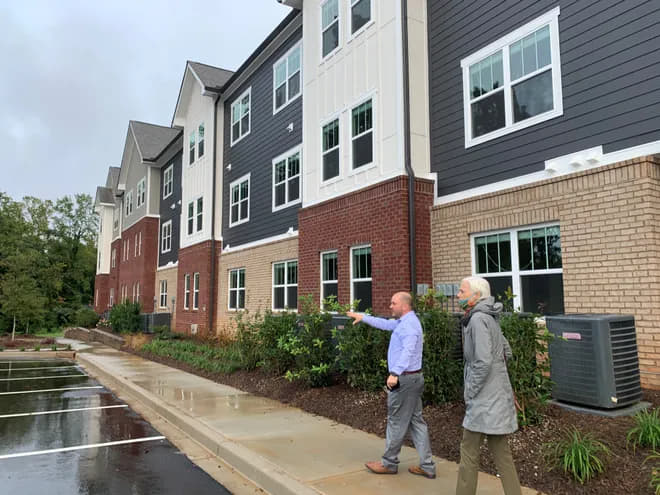As seniors age, their housing needs change. Low-income households often struggle to find affordable and safe housing that meets their budgetary needs. This can be especially true for singles or couples living on a fixed income. Fortunately, there are safe and low-cost senior housing options available for those in need of such services. In this blog post, we’ll cover the basics of finding the right type of senior rental property in your area so you can get back on your feet sooner rather than later.
Find and Pay for Low Income Senior Housing
Housing Choice Vouchers
This program allows you to have more control over your housing choices. You can search for housing that meets your preferences, and the government provides financial assistance directly to the landlord each month, covering a portion of your rent based on the amount specified by your voucher.
Public Housing
Managed by city or county public housing agencies, public housing communities typically consist of apartment buildings or complexes. They offer affordable housing options specifically targeted towards low-income individuals, including seniors. These communities often provide additional amenities and support services to enhance the quality of life for residents.
Low-Income Housing Tax Credit
The Low-Income Housing Tax Credit (LIHTC) program aims to provide affordable housing options for low-income families, including seniors. This program incentivizes private developers to build and maintain affordable housing by offering tax credits. As a result, rents for these properties are set at affordable levels, ensuring that they do not exceed a fixed percentage of the tenant's income.
Section 202 Supportive Housing for the Elderly
The Section 202 Supportive Housing for the Elderly program specifically targets seniors and individuals with disabilities. It provides housing options that allow residents to maintain their independence while also receiving assistance with daily tasks such as cleaning, cooking, and accessing supportive services. These housing communities often have on-site staff and resources tailored to the unique needs of seniors.
Affordable Senior Housing Search Tips
When searching for affordable senior housing, there are several helpful tips to consider. Begin your search by utilizing online resources, such as HUD.gov, which is an excellent starting point, according to Wid Covey, director of business development and founder of SeniorLeaf in the Salt Lake City area.
The AARP and AARP Foundation's Future of Housing Initiative is dedicated to creating more affordable communities, including age-friendly row homes and accessory dwelling units. Additionally, websites like After55.com and SeniorHousingNet.com specialize in senior living and provide search functionalities for low-income housing options.
To gather local information, reach out to your local housing authority. They can provide you with valuable insights on affordable housing communities in your area. Mike Wiacek, vice president of asset and property management at Wendover Housing Partners in Altamonte Springs, Florida, suggests contacting your local housing authority to obtain details about the maximum rent cost for tax credit affordable properties in your county.
If you reside in an area that spans multiple counties, it's advisable to check with the Housing Authority in each county to determine the most cost-effective choice available to you.
Senior Housing Location Criteria
Availability
In smaller cities or areas with lower population densities, low-income housing options may fill up quickly. It's important to be aware that the availability of affordable housing can be limited in such areas. If you're flexible with your location, larger cities often have more openings and a greater variety of options.
Waiting Lists
Even in more urban areas, it's common to encounter waiting lists for senior apartments. Be prepared for the possibility of having to join a waiting list before securing a housing unit. However, the advantage of larger cities is that they tend to offer a wider range of options, which increases your chances of finding an available unit.
Affordability
Different regions of the country vary in terms of housing affordability. Some areas, such as West Virginia, Mississippi, Arkansas, Oklahoma, Indiana, Kentucky, Ohio, Iowa, Alabama, and Kansas, have lower average property prices, making them potentially viable options for low-income apartments. Conducting research on regional housing costs can help you identify more affordable areas that align with your budget.
Dedicated Senior Living
Many urban cities, such as Atlanta, Austin, Denver, New York City, Pittsburgh, and Tampa, have specific housing options dedicated to seniors with low incomes. These cities may offer specialized communities and resources tailored to the needs of senior residents. Exploring these locations could provide more suitable housing options.
Conclusion
In conclusion, low-income seniors face difficulties in finding affordable and safe housing. However, there are various options available to assist them, including Housing Choice Vouchers, public housing, the Low-Income Housing Tax Credit program, and the Section 202 Supportive Housing for the Elderly. To find suitable housing, seniors can utilize online resources, reach out to local housing authorities, and consider location criteria such as availability, waiting lists, affordability, and dedicated senior living options. These resources and strategies can help seniors secure affordable housing that meets their needs and budgetary constraints.





